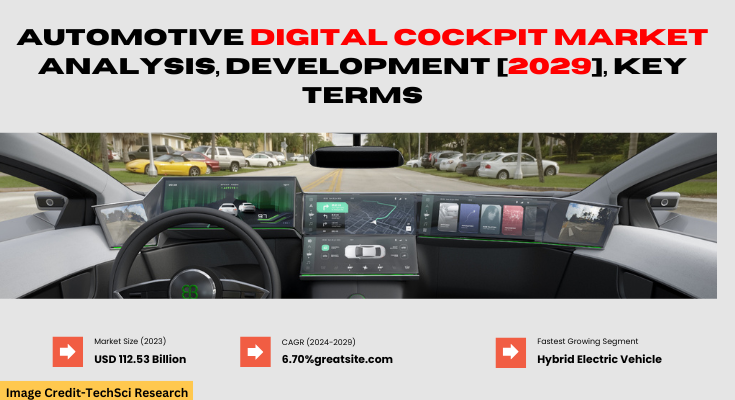According to TechSci Research report, “Automotive Digital Cockpit Market – Global Industry Size, Share, Trends, Competition Forecast & Opportunities, 2029”, the Global Automotive Digital Cockpit Market stood at USD 112.53 Billion in 2023 and is anticipated to grow with a CAGR of 6.70% in the forecast period, 2025-2029.
The automotive digital cockpit market is a pivotal segment in the automotive industry, focused on revolutionizing the interior design and user experience of vehicles through advanced digital display and control systems. A digital cockpit refers to the integration of digital display screens, touch panels, and electronic control units to replace traditional analog gauges, knobs, and buttons in a vehicle’s dashboard and center console. This shift towards digitalization aims to enhance driver and passenger interaction, provide customizable information and entertainment options, and improve overall vehicle functionality and aesthetics.
One of the primary functions of automotive digital cockpits is to provide drivers with intuitive and customizable access to vehicle information, entertainment, and connectivity features. Digital display screens replace traditional analog gauges and meters, offering high-resolution visuals and interactive interfaces that can be personalized to display relevant driving data, navigation directions, multimedia content, and smartphone integration. Touch panels and gesture control systems further enhance user interaction, allowing drivers to access and control various functions with ease and convenience.
Moreover, automotive digital cockpits contribute to enhancing driving safety and convenience by integrating advanced driver assistance systems (ADAS) and vehicle connectivity features. Digital display screens can serve as the interface for displaying real-time information from ADAS sensors, such as lane departure warnings, collision alerts, and adaptive cruise control settings, enhancing driver awareness and responsiveness to potential hazards on the road. Additionally, connectivity features enable seamless integration with smartphones, enabling hands-free calling, messaging, and access to music streaming and navigation services.
Additionally, automotive digital cockpits play a crucial role in elevating the overall aesthetics and interior design of vehicles. By replacing traditional mechanical controls and analog displays with sleek digital interfaces, digital cockpits offer a modern and futuristic look that aligns with the evolving expectations of tech-savvy consumers. Customizable themes, ambient lighting, and high-resolution graphics further enhance the visual appeal and ambiance of the vehicle’s interior, creating a more immersive and enjoyable driving experience for occupants.
Furthermore, advancements in display technology, human-machine interface (HMI) design, and software integration are driving innovation in automotive digital cockpits. Manufacturers are investing in technologies such as OLED displays, augmented reality head-up displays (HUDs), and natural language voice recognition to enhance the functionality and user experience of digital cockpits. Additionally, integration with artificial intelligence (AI) and cloud-based services enables predictive analytics and personalized recommendations, further enhancing the overall utility and convenience of digital cockpit systems.
In conclusion, the automotive digital cockpit market is at the forefront of transforming the driving experience through innovative digital display and control systems. By offering customizable information, entertainment, and connectivity options, digital cockpits enhance driver and passenger interaction, improve safety and convenience, and elevate the aesthetics of vehicle interiors. With ongoing advancements in technology and design, digital cockpits are poised to become standard features in next-generation vehicles, shaping the future of automotive interiors.
Browse over market data Figures spread through 180 Pages and an in-depth TOC on “ Global Automotive Digital Cockpit Market.” @ https://www.techsciresearch.com/report/automotive-digital-cockpit-market/21162.html
The automotive engine cooling system market is witnessing growth across various regions, including Asia Pacific, North America, Europe & CIS, South America, and the Middle East & Africa. Engine cooling systems play a crucial role in maintaining optimal operating temperatures for vehicle engines, thereby ensuring efficient performance and longevity. Let’s delve into the market overview of each region:
In the Asia Pacific region, which comprises countries like China, India, Japan, and South Korea, the automotive engine cooling system market is experiencing significant growth. The region is home to some of the largest automotive markets globally and is witnessing robust growth in vehicle production and sales. Factors such as rapid urbanization, increasing disposable incomes, and growing automotive infrastructure are driving the demand for engine cooling systems in the region.
North America represents another key market for automotive engine cooling systems, with the United States and Canada being major contributors to market growth. The region has a mature automotive industry and a high vehicle ownership rate, driving the demand for replacement and aftermarket engine cooling systems. Additionally, stringent emission regulations in the region are prompting automakers to invest in advanced cooling technologies to improve engine efficiency and reduce emissions.
Europe & CIS also constitute a significant market for automotive engine cooling systems, with countries like Germany, France, and Russia leading the market. The region has a well-established automotive manufacturing base and is known for its technological advancements in automotive engineering. Stringent emission standards in the European Union are driving the adoption of innovative engine cooling solutions, including electric cooling fans and advanced coolant systems.
South America is witnessing steady growth in the automotive engine cooling system market, with countries like Brazil, Argentina, and Chile driving market demand. The region’s automotive industry is growing, supported by rising consumer demand for vehicles with improved performance and efficiency. Engine cooling systems are essential components in vehicles operating in the region’s diverse climatic conditions, driving the demand for reliable and efficient cooling solutions.
The Middle East & Africa region is also experiencing growth in the automotive engine cooling system market, albeit at a slower pace compared to other regions. The region’s automotive industry is evolving, driven by infrastructure development and increasing consumer demand for vehicles with advanced features. Engine cooling systems are becoming increasingly important in the region as automakers focus on improving vehicle reliability and durability.
Overall, the global automotive engine cooling system market is characterized by growth across multiple regions, driven by factors such as increasing vehicle production, stringent emission regulations, and technological advancements in cooling technologies. As automakers continue to prioritize vehicle efficiency and performance, the demand for advanced engine cooling systems is expected to further drive market growth in the coming years.
Major companies operating in the Global Automotive Digital Cockpit Market are:
- Faurecia
- Aptiv
- Continental
- Robert Bosch GmbH
- Panasonic Corporation
- Denso Corporation
- HARMAN International
- Visteon Corporation
- Pioneer Corporation
- Nippon Seiki Co., Ltd.
Download Free Sample Report @ https://www.techsciresearch.com/sample-report.aspx?cid=21162
Customers can also request 10% free customization in this report.
“The evolution of digital cockpits represents a pivotal moment in the industry’s trajectory. The seamless integration of AI, customizable interfaces, and advanced connectivity not only enhances the driving experience but also lays the foundation for the future of smart and autonomous vehicles. As consumers increasingly prioritize technology-rich interiors, manufacturers must continue to innovate and prioritize user-centric design to stay at the forefront of this transformative shift,” said Mr. Karan Chichi, Research Director with TechSci Research, a research-based management consulting firm.
“Automotive Digital Cockpit Market – Global Industry Size, Share, Trends Opportunity, and Forecast, Segmented By Vehicle Type (Light Commercial Vehicles, Passenger Cars, Heavy Commercial Vehicles), By Equipment (Digital Instrument Cluster Display Type, Advanced Head Unit, Head-Up Display (HUD), Camera-Based Driver Monitoring System), By Propulsion (Hybrid Electric Vehicle (HEV), Battery Electric Vehicle (BEV), Plug-In Hybrid Electric Vehicle (PHEV), Internal Combustion Engine (ICE)), By Region, Competition, 2019-2029”, has evaluated the future growth potential of Global Automotive Digital Cockpit Market and provides statistics & information on market size, structure, and future market growth. The report intends to provide cutting-edge market intelligence and help decision makers take sound investment decisions. Besides, the report also identifies and analyzes the emerging trends along with essential drivers, challenges, and opportunities in the Global Automotive Digital Cockpit Market.
You may also read:
Luxury Yacht Market [2029] Exploring Potential, Growth, Future & Trends
All Weather Tire Market [2029] – Analysis, Trends, & Insights
Electric Bus Charging Infrastructure Market Advancements and Business Opportunities [2029]
Automotive Steering Knuckle Market – A Comprehensive Report [2029]
Electric Cargo Bikes Market [2029] Exploring Potential, Growth, Future & Trends
Electric Truck Market [2029]- A Deep Dive into the Latest Market Trends, Market Segmentation
Table of Content-Automotive Digital Cockpit Market
- Introduction
1.1. Product Overview
1.2. Key Highlights of the Report
1.3. Market Coverage
1.4. Market Segments Covered
1.5. Research Tenure Considered
- Research Methodology
2.1. Objective of the Study
2.2. Baseline Methodology
2.3. Key Industry Partners
2.4. Major Association and Secondary Sources
2.5. Forecasting Methodology
2.6. Data Triangulation & Validation
2.7. Assumptions and Limitations
- Executive Summary
3.1. Market Overview
3.2. Market Forecast
3.3. Key Regions
3.4. Key Segments
- Impact of COVID-19 on Global Automotive Digital Cockpit Market
- Global Automotive Digital Cockpit Market Outlook
5.1. Market Size & Forecast
5.1.1. By Value
5.2. Market Share & Forecast
5.2.1. By Vehicle Type Market Share Analysis (Light Commercial Vehicles, Passenger Cars, Heavy Commercial Vehicles))
5.2.2. By Equipment Market Share Analysis (Digital Instrument Cluster Display Type, Advanced Head Unit, Head-Up Display (HUD), Camera-Based Driver Monitoring System)
5.2.3. By Propulsion Market Share Analysis (Hybrid Electric Vehicle (HEV), Battery Electric Vehicle (BEV), Plug-In Hybrid Electric Vehicle (PHEV), Internal Combustion Engine (ICE))
5.2.4. By Region Market Share Analysis
5.2.4.1. Asia-Pacific Market Share Analysis
5.2.4.2. Europe & CIS Market Share Analysis
5.2.4.3. North America Market Share Analysis
5.2.4.4. South America Market Share Analysis
5.2.4.5. Middle East & Africa Market Share Analysis
5.2.5. By Company Market Share Analysis (Top 5 Companies, Others – By Value, 2023)
5.3. Global Automotive Digital Cockpit Market Mapping & Opportunity Assessment
5.3.1. By Vehicle Type Market Mapping & Opportunity Assessment
5.3.2. By Equipment Market Mapping & Opportunity Assessment
5.3.3. By Propulsion Market Mapping & Opportunity Assessment
5.3.4. By Regional Market Mapping & Opportunity Assessment
- Asia-Pacific Automotive Digital Cockpit Market Outlook
6.1. Market Size & Forecast
6.1.1. By Value
6.2. Market Share & Forecast
6.2.1. By Vehicle Type Market Share Analysis
6.2.2. By Equipment Market Share Analysis
6.2.3. By Propulsion Market Share Analysis
6.2.4. By Country Market Share Analysis
6.2.4.1. China Market Share Analysis
6.2.4.2. India Market Share Analysis
6.2.4.3. Japan Market Share Analysis
6.2.4.4. Indonesia Market Share Analysis
6.2.4.5. Thailand Market Share Analysis
6.2.4.6. South Korea Market Share Analysis
6.2.4.7. Australia Market Share Analysis
6.2.4.8. Rest of Asia-Pacific Market Share Analysis
6.3. Asia-Pacific: Country Analysis
6.3.1. China Automotive Digital Cockpit Market Outlook
6.3.1.1. Market Size & Forecast
6.3.1.1.1. By Value
6.3.1.2. Market Share & Forecast
6.3.1.2.1. By Vehicle Type Market Share Analysis
6.3.1.2.2. By Equipment Market Share Analysis
6.3.1.2.3. By Propulsion Market Share Analysis




